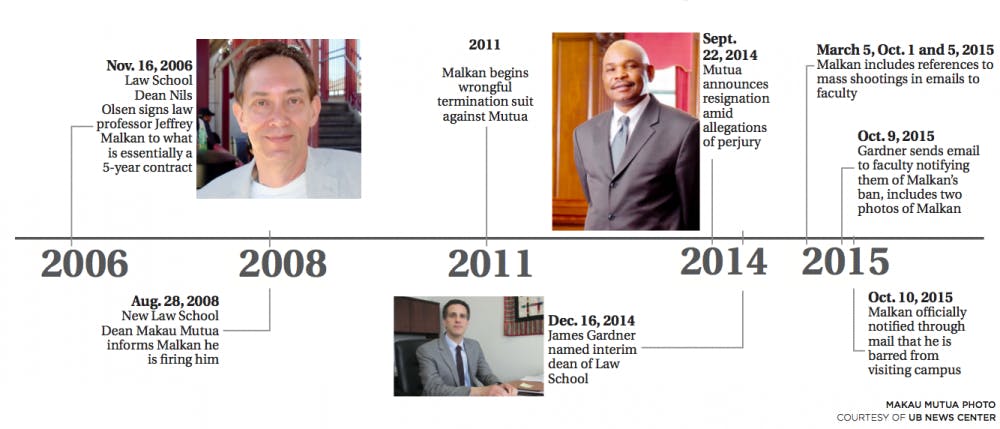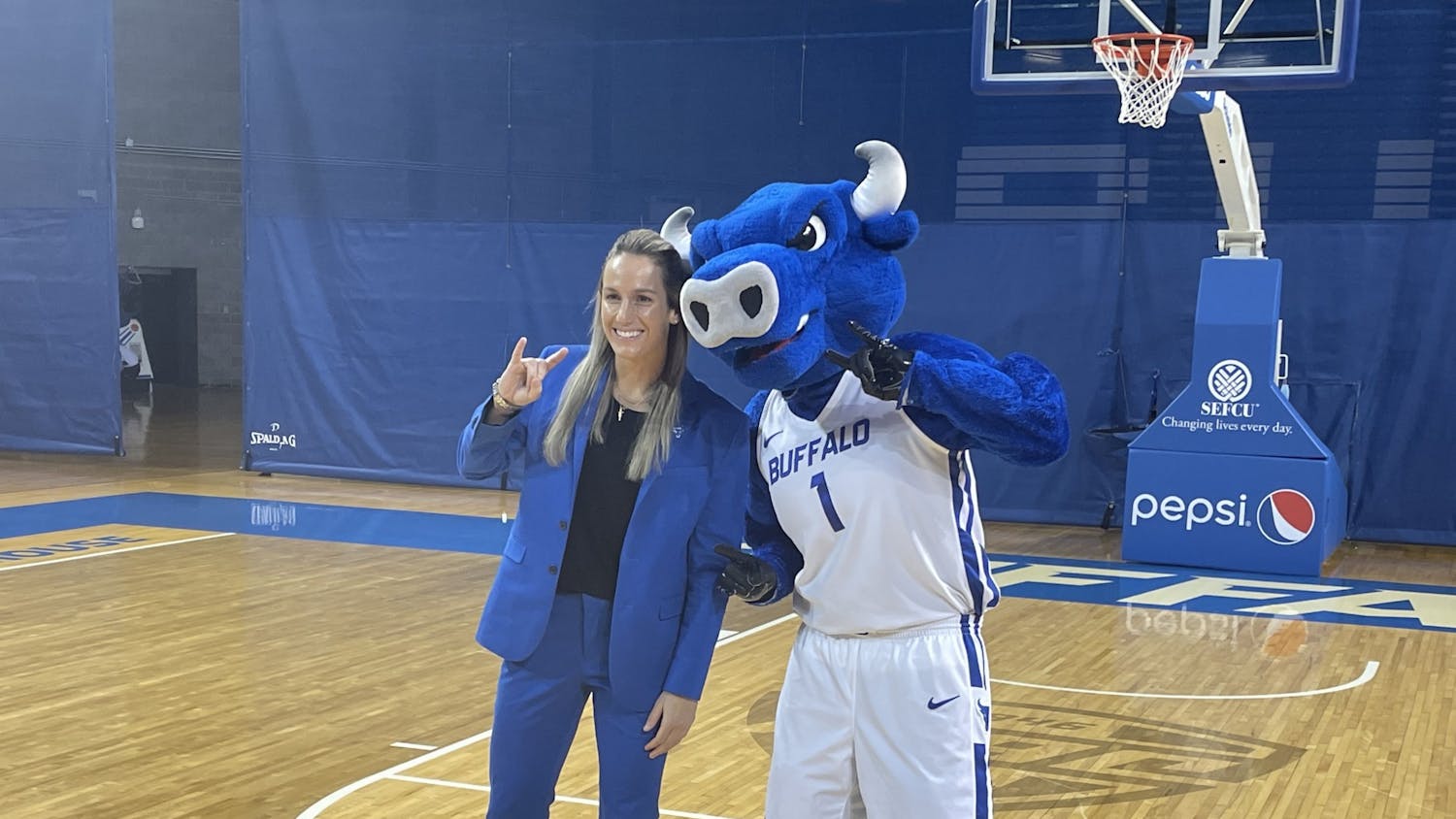UB has banned a former law professor from campus after he sent emails to faculty referencing mass shootings on college campuses.
Jeffrey Malkan, a former adjunct law professor who has an ongoing wrongful termination suit against former Law School Dean Makau Mutua, sent three separate mass emails to law school faculty during the past seven months referencing two shootings on college campuses and one at an elementary school.
Malkan, who has sent nearly 200 emails about his firing and lawsuit to faculty during the past year, insists his emails were not threatening. He said he started sending emails to faculty in 2011 to update his former colleagues about his case and to ask for their help.
He said he only mentioned shootings in his recent emails because Mutua and Interim Law School Dean James Gardner have been “spreading rumors” that he was “unbalanced” and a danger to people in the law school.
He said being associated with such crimes and the insinuation that he was capable of committing such a crime was causing him distress.
Since his termination in 2009, which Malkan insists is unjust, he has been unable to find work, largely, he said, because UB has refused to write him a reference letter or remove the termination from his record. Malkan claims he has not been on campus since May of 2009 and has not been in Buffalo since December 2013. He currently lives in Stony Brook, New York.
“I did not say that violence is the appropriate response to any injustice and did not compare myself in any way to mass shooters,” Malkan said.
While a University Police officer determined Malkan posed no threat to campus after questioning him over the phone, UB officials said faculty and staff were fearful about Malkan’s emails and the ban was done as “as a precautionary step to ensure the safety of our campus community.”
University officials said UB’s policy on Workplace Violence Prevention says the university will not tolerate acts that cause fear of harm whether directly or indirectly.
The Spectrum obtained the official letter Barbara Ricotta, vice president of student affairs, mailed to Malkan’s home Saturday notifying him of his persona non grata status. The letter states Malkan can be charged with criminal trespassing if caught on university-owned property.
UB officials said 251 individuals have been barred from campus over the past 10 years.
While UB maintains Malkan’s emails caused fear and distress among law school faculty, at least some of those faculty members support the former professor.
Some law school faculty believe Malkan was unfairly terminated and that the university has treated him inappropriately and allowed his case -- which began with his termination notification in 2008 and continued with the lawsuit he filed in 2011 -- to drag on too long and at too high a professional and personal cost to Malkan and UB.
Faculty said UB not refuting Mutua’s actions raises concerns for faculty job security and sends a message that a dean can terminate faculty members without faculty review or other oversight or without following internal procedures.
The faculty also said UB could have settled Malkan’s case years ago.
UB officials said the ongoing lawsuit has cost the university nothing, saying the lawsuit is against Mutua in his “individual, not official capacity.” Officials also said the attorney general represents Mutua as an individual.
Some law professors feel UB has mishandled Malkan for a second time by banning him from campus. One professor who wished to remain anonymous suggested UB was creating a potential threat rather than preventing one.
The situation “represents a serious ongoing travesty of justice by the law school and University and ongoing bad risk management strategies,” the professor said. “It would have been reasonable and beneficial for all to have settled with Malkan early on, treating him with dignity and with a careful evaluation of the facts of his claims.”
Malkan’s battle with the law school goes back to 2008.
Mutua, who had just recently been promoted to permanent dean, fired Malkan despite Malkan having signed what was essentially a 5-year clinical professor contract in November of 2006. It stated he could only be fired for cause in accordance with the law school accreditation standard.
After Malkan filed suit, Mutua allegedly lied under oath when he claimed a faculty vote to promote Malkan to clinical professor never occurred. Seven UB faculty members have testified under oath that the vote did take place.
Mutua resigned as dean in September of 2014 amid the allegations and has been on leave since December.
University officials said UB does not comment on pending litigation and UB is not party to or involved in the Mutua litigation.
The law professor who spoke to The Spectrum said there “is no reason for the University to violate the law and to continue to defend what appears to be clearly untruthful testimony.”
In his mass emails, Malkan has mentioned the 2012 Sandy Hook Elementary School shooting, the 2010 University of Alabama in Huntsville shooting and most recently, theUmpqua Community College (UCC) shooting in Oregon on Oct. 1.
The same day as the UCC shooting, Malkan sent law faculty an email saying, “Today’s terrible crime is unspeakably tragic. Every time this senseless and insane violence recurs, which is all too often, I despair that I will ever recover my reputation and dignity.”
Malkan said he only mentioned these shootings in the context that he is “extremely distressed” that Mutua and Gardner have associated him with mass shootings by making comments he is unstable and a threat to faculty. Mutua said in a 2013 deposition that Malkan could “go postal” at any time, according to Malkan.
Officials said faculty were alarmed by Malkan’s reference to a University of Alabama in Huntsville faculty member fatally shooting her colleagues because the case involved workplace violence.
Malkan claims Gardner instigated the ban by reporting the emails to UB University Police. Malkan believes Gardener made the reports in order to defame him and gain an advantage in the ongoing legal battle. He claims Gardner and Mutua are hoping to take advantage of the national climate of fear over school shootings to paint him as a potential threat.
The university denies both of these claims. Officials said the university forwarded Malkan’s emails to UPD because of faculty fear of the school shootings referenced in the emails.
The Spectrum asked UPD for the police report regarding Malkan’s emails. Chief of Police Gerald Schoenle said no police report exists and called the case an “administrative matter.”
The Spectrum obtained an email Gardner sent to law school faculty on Friday informing them that Malkan was banned from campus and advising them to call UPD if they see Malkan on campus. The email included two photos of Malkan.
“The safety of each and every one of you is my number one priority,” Gardner wrote in the email.
UB is not the only institution sending out warnings about Malkan. David Sleight, the assistant attorney general in the Mutua lawsuit, said in Oct. 2 court papers that the attorney general’s office sent out an office-wide warning about Malkan. Sleight declined comment Tuesday because of the ongoing case.
The next step in Malkan’s legal case against Mutua is solving Malkan and Sleight’s Rule 11 sanctions against one another.
According to photos and tweets posted on Mutua’s Twitter account, the former dean has been traveling to places such as Rome and his native Kenya during his leave of absence, but returned to Buffalo on Oct. 8.
Malkan can appeal his ban from campus in one year’s time.
Tom Dinki is the editor in chief and can be reached at tom.dinki@ubspectrum.com. Follow him on Twitter at @tomdinki.





